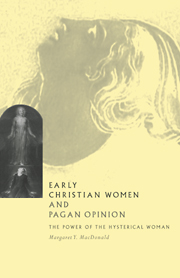Book contents
- Frontmatter
- Contents
- Preface
- List of abbreviations
- Introduction
- PART ONE Pagan reaction to early Christian women in the second century CE
- PART TWO Celibacy, women, and early church responses to public opinion
- PART THREE Marriage, women, and early church responses to public opinion
- General conclusion
- Bibliography
- Index
PART THREE - Marriage, women, and early church responses to public opinion
Published online by Cambridge University Press: 15 December 2009
- Frontmatter
- Contents
- Preface
- List of abbreviations
- Introduction
- PART ONE Pagan reaction to early Christian women in the second century CE
- PART TWO Celibacy, women, and early church responses to public opinion
- PART THREE Marriage, women, and early church responses to public opinion
- General conclusion
- Bibliography
- Index
Summary
In recent years many scholars have suggested that women's attraction to early Christianity was related to the freedoms offered in celibacy. Dennis R. MacDonald, for example, estimates that groups of widows, which in some early Christian circles may have included virgins who had never been married (cf. Ign. Smyrn. 13.1), were a counter-cultural force within their patriarchal society: ‘Perhaps we should interpret this virginity as a rebellion – conscious or unconscious – against male domination. Perhaps it symbolized not only moral purity, but also independence, dedication to a calling, and criticism of conjugal society.’ The criticism of society that MacDonald and others associate with celibate early church life is of particular importance for this book because it implies confrontation between early Christians and public opinion about the proper behaviour of women. When scholars address the situation of married women in the church, they often come to very different conclusions about the role these women played in church relations with the world. Elisabeth Schüssler Fiorenza contrasts the liberation from social constraints offered to celibate women by early Christianity, with the fate of the married early Christian women. Unmarried women acquire an independence which produces conflict with society; but married women remain, in conformity to society, confined within the patriarchal family:
Paul's advice to widows who were not necessarily ‘old’ – since girls usually married between twelve and fifteen years of age – thus offered a possibility for ‘ordinary’ women to become independent. [...]
- Type
- Chapter
- Information
- Early Christian Women and Pagan OpinionThe Power of the Hysterical Woman, pp. 183 - 248Publisher: Cambridge University PressPrint publication year: 1996



